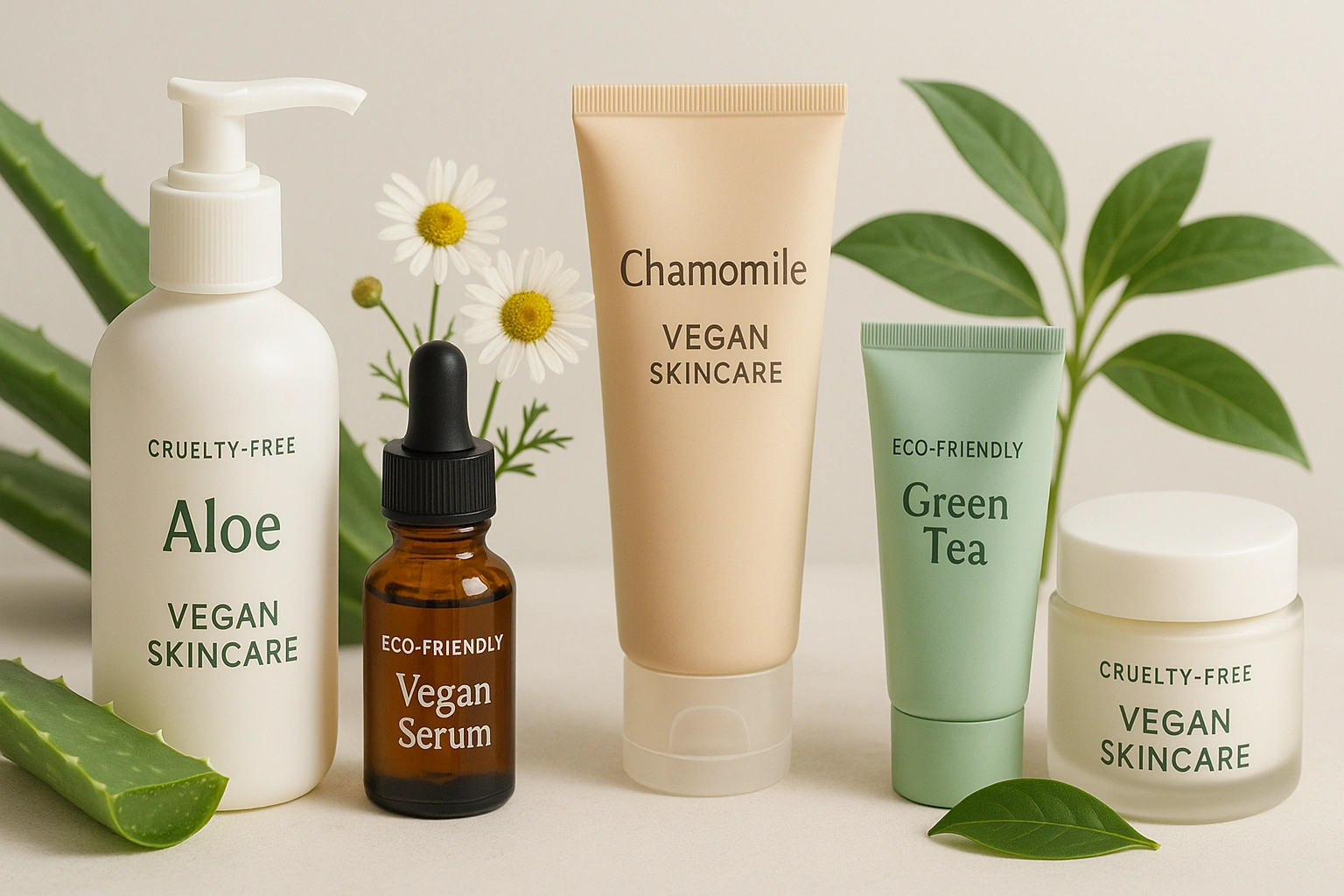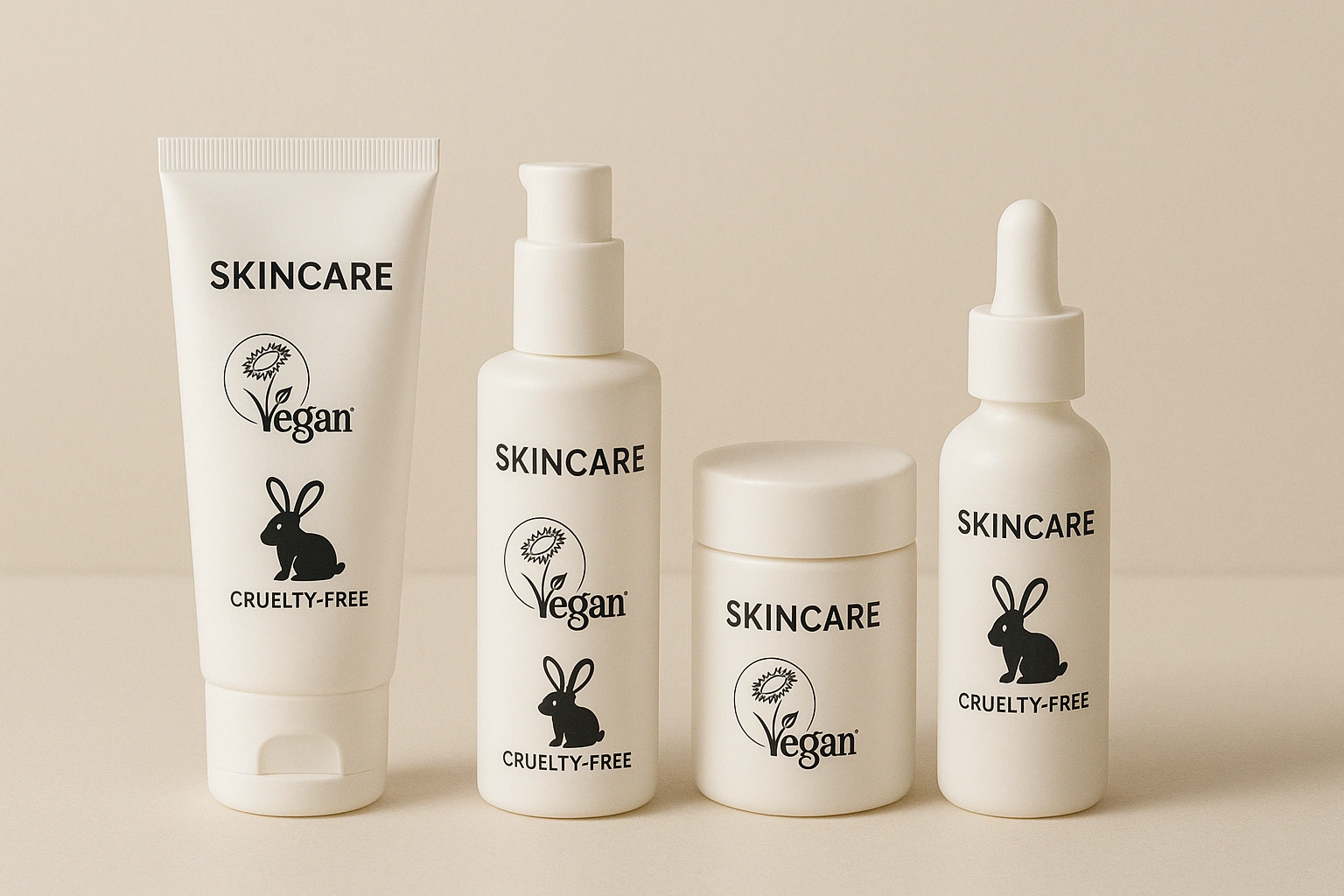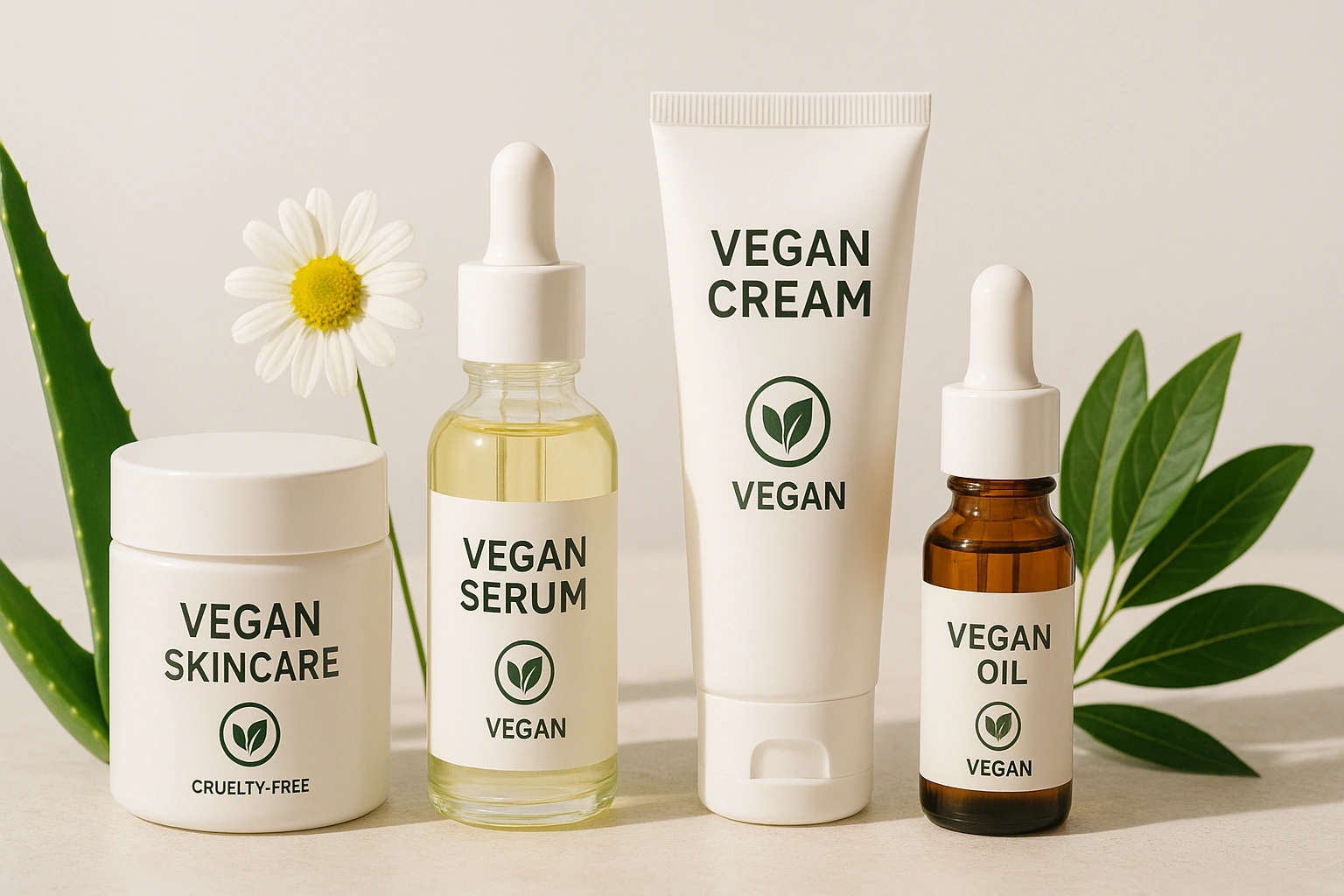Have you ever looked at the ingredient list on your favorite moisturizer and felt like you needed a chemistry degree to understand it? You’re not alone.
In a world saturated with complex formulas and questionable chemicals, a powerful movement is simplifying beauty: vegan skincare. But this is more than just a trend; it’s a conscious choice for healthier skin and a healthier planet. If you’ve ever wondered why vegan skincare is gaining so much momentum, you’re about to find out.
By the end of this guide, you’ll understand the incredible benefits of plant-powered beauty, know how to distinguish truly vegan products from clever marketing, and feel empowered to build a routine that aligns with your values and gives you the radiant skin you deserve.
- What Exactly Is Vegan Skincare?
- The Core Benefits of Switching to Vegan Skincare
- How to Read Labels: Identifying Truly Vegan Products
- Making the Switch: A Simple 3-Step Guide
- Vegan vs. Cruelty-Free vs. Natural: What’s the Difference?
- Common Mistakes to Avoid When Going Vegan with Skincare
- Expert Tips for Maximizing Your Vegan Skincare Routine
- Frequently Asked Questions (FAQ)
- Your Skin and Your Conscience Will Thank You
What Exactly Is Vegan Skincare?
In simple terms, vegan skincare refers to products made without any animal-derived ingredients or by-products. This is different from “cruelty-free,” which means a product and its ingredients were not tested on animals. While many vegan products are also cruelty-free (and should be!), the terms are not interchangeable.
Common Animal-Derived Ingredients Avoided in Vegan Skincare:
- Lanolin: A grease derived from sheep’s wool.
- Carmine: A red pigment made from crushed cochineal insects.
- Collagen: Often sourced from the skin, bones, and connective tissues of animals like cows and fish.
- Beeswax (Cera Alba): A natural wax produced by honey bees.
- Guanine: Derived from fish scales, used to create shimmer in cosmetics.
- Squalene: Traditionally sourced from shark liver oil (though plant-based squalane is a popular vegan alternative).
The shift towards plant-based living is undeniable. The global vegan cosmetics market is projected to reach over $21 billion by 2027, according to Statista. This explosive growth reflects a deeper consumer demand for transparency, efficacy, and ethical production in 2025 and beyond.

The Core Benefits of Switching to Vegan Skincare
So, why make the switch? The reasons go far beyond ethics. Adopting a vegan skincare routine can fundamentally change your skin’s health for the better.
Kinder to Your Skin: Fewer Harsh Chemicals
Vegan formulas are often gentler because they rely on natural, plant-derived ingredients instead of synthetic chemicals or animal by-products, which can be harsh and irritating. They tend to have shorter, more recognizable ingredient lists, leaving less room for potential irritants that can trigger sensitivity, redness, and breakouts.
Packed with Plant-Powered Nutrients
Plants are nature’s most potent source of vitamins, minerals, antioxidants, and essential fatty acids. Vegan skincare harnesses this power directly.
- Antioxidants (like Vitamin C and E): Fight free radicals, protect against environmental damage, and brighten the complexion.
- Botanical Extracts (like Green Tea or Chamomile): Soothe inflammation and calm irritated skin.
- Natural Oils (like Jojoba or Rosehip): Provide deep hydration and nourishment without clogging pores.
The Ultimate Choice for Sensitive and Acne-Prone Skin
If you struggle with sensitive, reactive, or acne-prone skin, vegan skincare could be a game-changer. By eliminating common animal-derived irritants and focusing on anti-inflammatory plant ingredients, these products can help calm redness, reduce breakouts, and restore your skin’s natural balance. Research from the National Institutes of Health has highlighted the powerful anti-inflammatory and antioxidant properties of many plant extracts used in cosmetics.
A Clear Conscience: The Benefits of Cruelty-Free Beauty
This is one of the most compelling reasons people explore why vegan skincare is the right choice. Choosing vegan means you are actively voting against practices that harm animals. The benefits of cruelty-free beauty extend beyond your own skin, contributing to a more compassionate and ethical industry. You can enjoy your routine knowing no living beings were harmed for your glow.
Better for the Planet: An Eco-Friendly Choice
Animal agriculture carries a significant environmental footprint. By opting for plant-based ingredients, you support a more sustainable system that generally requires less water, land, and energy to produce. Many vegan brands also prioritize eco-friendly packaging and sustainable sourcing, further reducing their impact on the planet. This commitment to sustainability is a core reason why technology and consumer goods are evolving, a trend also seen in fields like automation at ventures like AI Robotics.
How to Read Labels: Identifying Truly Vegan Products
Navigating the beauty aisle can be tricky. “Greenwashing”—where brands use misleading terms like “natural” or “eco-friendly” to appear more conscious than they are—is rampant. To ensure a product is truly vegan, look for official certifications.
Key Logos to Trust:
- The Vegan Society Trademark: The gold standard, certifying that a product is free from animal ingredients and testing.
- PETA’s “Vegan” Logo: Indicates a product is vegan. PETA also has a separate “Cruelty-Free” logo (a bunny), so look for the specific vegan certification.
- Leaping Bunny Program: This is the most recognized logo for cruelty-free products, but it does not guarantee a product is vegan. Always check the ingredient list as well.

Making the Switch: A Simple 3-Step Guide
Transitioning your routine doesn’t have to be overwhelming or expensive. Here’s how to do it smoothly.
- Start Slow: Don’t throw out all your current products at once. Begin by replacing items as they run out. A good starting point is a daily essential like a cleanser or moisturizer.
- Identify Your Core Needs: What are your primary skin concerns? Dryness? Acne? Aging? Look for vegan products specifically formulated to target those issues.
- Patch Test Everything: This is non-negotiable. Before applying a new product to your entire face, test it on a small, discreet area (like behind your ear or on your inner wrist) for 24-48 hours to check for any reaction.
Pros & Cons of Switching to Vegan Skincare
| Pros | Cons |
|---|---|
| Gentler, more nourishing ingredients | Can be more expensive upfront |
| Better for sensitive & acne-prone skin | Transition period may cause skin “purging” |
| Ethical and cruelty-free | Requires more careful label-reading |
| More sustainable and eco-friendly | Some products have a shorter shelf life |
Vegan vs. Cruelty-Free vs. Natural: What’s the Difference?
These terms are often used together, but they mean very different things. Understanding the distinction is key to being an informed consumer.
| Term | What It Means | Key Features | Common Misconception |
|---|---|---|---|
| Vegan | Contains no animal-derived ingredients or by-products. | 100% plant-based or synthetic ingredients. | That it’s automatically natural or organic. |
| Cruelty-Free | The product and its ingredients were not tested on animals at any stage. | Focuses on the testing process, not the ingredients. | That it’s automatically vegan (may contain beeswax). |
| Natural | Ingredients are sourced from nature (plants, minerals) rather than labs. | Minimal synthetic ingredients. | That it’s always vegan, cruelty-free, or effective. |
Common Mistakes to Avoid When Going Vegan with Skincare
- Assuming “Natural” Means “Vegan”: Many “natural” products contain honey, beeswax, or lanolin. Always check for a vegan certification.
- Forgetting to Check Makeup and Haircare: Skincare is just one piece of the puzzle. Carmine (in lipstick) and keratin (in hair products) are common non-vegan ingredients.
- Not Giving Your Skin Time to Adjust: It can take 2-4 weeks for your skin to adapt to a new routine. Be patient before deciding a product doesn’t work.
- Falling for “Greenwashing”: Brands may highlight one plant ingredient on the front while hiding animal-derived ingredients in the fine print. Trust certifications over marketing claims.
- Thinking It Has to Be Expensive: While some niche brands are pricey, many affordable and effective vegan options are available from brands like The Ordinary, Pacifica, and Acure.
Expert Tips for Maximizing Your Vegan Skincare Routine
Ready to take your plant-powered routine to the next level? Here are some expert tips.
- Incorporate a Facial Oil: Plant-based oils like rosehip, sea buckthorn, or marula are packed with nutrients and can balance all skin types, even oily skin.
- Don’t Forget SPF: Finding a vegan and cruelty-free sunscreen is essential. Look for mineral-based formulas with zinc oxide or titanium dioxide.
- Listen to Your Skin: Just because a product is vegan doesn’t mean it’s right for you. Pay attention to how your skin responds and adjust accordingly.
- Seek Out Multi-Tasking Products: Simplify your routine with products that do more than one thing, like a hydrating cleanser that also removes makeup or a tinted moisturizer with SPF.
- Embrace the Philosophy:
“The biggest shift I see in clients who switch to vegan skincare is a reduction in chronic inflammation,” says celebrity esthetician Joanna Vargas. “When you feed your skin gentle, nutrient-dense ingredients, it has a chance to heal and truly thrive.”
Frequently Asked Questions (FAQ)
Q: Is vegan skincare better for acne?
A: For many people, yes. Vegan formulas often omit pore-clogging animal fats and common irritants. They are also rich in anti-inflammatory botanicals like tea tree oil and salicylic acid (from willow bark) that can help manage breakouts effectively.
Q: Do vegan skincare products expire faster?
A: Sometimes. Products without synthetic preservatives may have a shorter shelf life. However, many brands use effective natural preservatives like vitamin E, grapefruit seed extract, and essential oils to ensure product stability. Always check for a Period After Opening (PAO) symbol on the packaging.
Q: Are all vegan products automatically “clean” or “organic”?
A: No. “Vegan” only refers to the absence of animal ingredients. A vegan product can still contain synthetic chemicals or non-organic ingredients. If “clean” or “organic” is important to you, look for those specific claims and certifications in addition to the vegan label.
Q: Why is some vegan skincare so expensive?
A: Cost can be influenced by high-quality, sustainably sourced botanical ingredients, organic certifications, and investments in eco-friendly packaging. However, the market is full of affordable and effective vegan options.
Q: How can I be 100% sure a product is vegan?
A: The most reliable way is to look for an official certification from a trusted organization like The Vegan Society. If there’s no logo, carefully scrutinize the full ingredient list or check the brand’s FAQ page on their website.
Your Skin and Your Conscience Will Thank You
Making the switch to a vegan skincare routine is one of the most powerful things you can do for your skin, the animals, and the environment. By choosing plant-powered formulas, you are nourishing your complexion with the best that nature has to offer while promoting a more ethical and sustainable beauty industry. Understanding why vegan skincare is more than a fleeting trend is the first step toward a cleaner, kinder, and more radiant future.
Ready to explore more about conscious consumerism? Let us know in the comments what your favorite vegan skincare product is!
